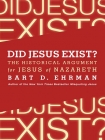Did Jesus Exist? - The Historical Argument for Jesus of Nazareth Bart Ehrman (books to read in your 20s txt) 📖

- Author: Bart Ehrman
Book online «Did Jesus Exist? - The Historical Argument for Jesus of Nazareth Bart Ehrman (books to read in your 20s txt) 📖». Author Bart Ehrman
Jesus obviously could have associated with any religious leader of his day. He could have become a Pharisee or practiced the cult in the Temple or joined an Essene community or a band of revolutionaries. Of all the options, he chose John the Baptist. This must mean that he agreed with the particular message John was proclaiming. John’s message was one of impending apocalyptic judgment. Jesus started his public ministry subscribing to that view.
We not only know how Jesus started, we also know, with even greater certainty, what happened among his followers after he died. They began to establish communities of believers around the Mediterranean. We have our first glimpse of these communities in the writings of our earliest Christian author, Paul. And it is clear what these communities (and Paul) were like. They were filled with expectations that they—the Christians at the time—would be alive when Jesus returned from heaven as judge of the earth (see, for example, 1 Thessalonians 4:13–5:12 and 1 Corinthians 15). In other words, Christianity started out as an apocalyptic movement after the death of Jesus.
This too is highly significant for our present discussion. At the beginning of Jesus’s ministry he associated with an apocalyptic prophet, John; in the aftermath of his ministry there sprang up apocalyptic communities. What connects this beginning and this end? Or put otherwise, what is the link between John the Baptist and Paul? It is the historical Jesus. Jesus’s public ministry occurs between the beginning and the end. Now if the beginning is apocalyptic and the end is apocalyptic, what about the middle? It almost certainly had to be apocalyptic as well. To explain this beginning and this end, we have to think that Jesus himself was an apocalypticist.
That is to say, if Jesus started out apocalyptically but then in the aftermath of his life the communities of his followers were not apocalyptically oriented, one could easily argue that Jesus moved away from being an apocalypticist after his association with John. But that is not the case: the later communities were in fact apocalyptic in nature and presumably took their cues from him. So too, if Jesus did not start out apocalyptically but the later communities were apocalyptic, one could argue that Jesus himself was not an apocalypticist but that later followers of his changed his message to make it apocalyptic. But that cannot be argued either because Jesus did indeed start out apocalyptically. The only plausible explanation for the connection between an apocalyptic beginning and an apocalyptic end is an apocalyptic middle. Jesus, during his public ministry, must have proclaimed an apocalyptic message.
I think this is a powerful argument for Jesus being an apocalypticist. It is especially persuasive in combination with the fact, which we have already seen, that apocalyptic teachings of Jesus are found throughout our earliest sources, multiply attested by independent witnesses.
Jesus, then, is best understood in general terms as an apocalypticist. What can we say specifically about what he taught and did?
The Apocalyptic Proclamation of Jesus
JESUS’S APOCALYPTIC MESSAGE FOCUSED on the coming kingdom of God. The first words he is recorded as saying set the tone for much of his public proclamation: “The time has been fulfilled and the kingdom of God is near. Repent and believe the good news” (Mark 1:15). This is an apocalyptic message. A certain amount of time has been allotted to the current age, and that time is up. Now the new age is soon to arrive, the kingdom of God. Jesus’s listeners are to repent in preparation for that coming kingdom.
The Kingdom of God
When people today hear the term kingdom of God, they typically think of heaven, as the place where souls go once they die. But that is not what apocalypticists meant, as we have already seen. For Jesus the kingdom was an actual place, here on earth, where God would rule supreme. And so, for example, Jesus speaks about his twelve disciples sitting on twelve thrones as rulers in the coming kingdom (Matthew 19:28; this comes from Q); he talks about eating and drinking in this kingdom; and he talks about people being cast out of the kingdom (more Q: see Luke 13:23–29). The kingdom was a real, tangible place, where love, peace, and justice would prevail.
The Son of Man
This future kingdom would be brought by a cosmic judge whom Jesus called the Son of Man. A number of sayings about the Son of Man are on the lips of Jesus in the early Gospels, and scholars have long puzzled over them. As this is a matter that is confusing to many readers, I need to say a few words about the situation.
In some of the sayings Jesus is alleged to have said, it is clear that he is referring to himself as the Son of Man. On occasion, for example, he talks about his present life in these terms: “Foxes have lairs and birds have nests, but the Son of Man has nowhere to lay his head” (Luke 9:58). On other occasions he uses the phrase when referring to his future fate: “The Son of Man will be handed over to the hands of others, and they will kill him, and after being killed he will arise after three days” (Mark 8:31).
In yet other instances there is nothing to indicate that when speaking about the Son of Man Jesus is referring to himself. This is true, for example, in Mark 8:38, already quoted above: “Whoever is ashamed of me and of my words in this adulterous and sinful generation, of that one will the Son of Man be ashamed when he comes in the glory of his Father with the holy angels.” If you did not already think that Jesus was the Son of Man, you certainly would not think so from this kind of statement; on the contrary, Jesus seems





Comments (0)